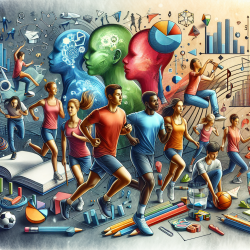Introduction
As educators and therapists, we are constantly seeking ways to improve academic outcomes for children. A recent study titled "An examination of the prospective association between physical activity and academic achievement in youth at the population level" provides valuable insights into the relationship between physical activity and academic performance. This blog will explore the findings of this research and offer practical steps for practitioners to integrate these insights into their practice.
Key Findings
The study analyzed data from the COMPASS study, involving nearly 10,000 adolescents, to determine the relationship between physical activity and academic achievement. The researchers used linear mixed models and generalized estimating equations to assess the impact of physical activity on English and Math grades. Surprisingly, the study found that the association between physical activity and academic achievement was effectively null. While organized sport participation showed slight positive associations, these were trivial in magnitude.
Implications for Practitioners
Despite the null findings regarding academic achievement, physical activity remains crucial for its numerous physical and mental health benefits. Here are some ways practitioners can use this information:
- Promote Physical Activity for Health Benefits: Encourage physical activity in schools for its well-documented benefits on mental health, mood, and overall physical well-being, rather than solely for academic gains.
- Balanced Curriculum: Advocate for a balanced curriculum that includes physical education, as it does not negatively impact academic performance and supports overall student health.
- Further Research: Engage in or support further research to explore the nuanced effects of physical activity on cognitive functions that may not directly translate to academic grades but enhance learning capabilities.
Encouraging Further Research
While this study provides a comprehensive analysis, it also highlights the need for further research. Future studies could focus on:
- Longitudinal impacts of physical activity on cognitive development and academic outcomes.
- The role of different types of physical activities, such as team sports versus individual exercises, on academic and cognitive performance.
- Exploring the potential indirect benefits of physical activity on academic achievement, such as improved concentration and behavior.
Conclusion
In conclusion, while the direct impact of physical activity on academic achievement may be minimal, its overall benefits to student health and well-being are undeniable. Practitioners should continue to advocate for physical activity in schools, focusing on its holistic benefits. For those interested in delving deeper into the research, you can read the original research paper An examination of the prospective association between physical activity and academic achievement in youth at the population level.










